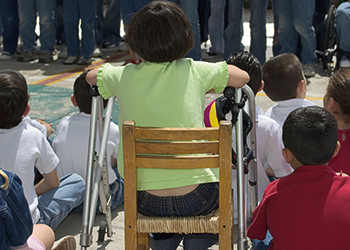Improving school climate through disability awareness programs
Recent research has demonstrated the importance of positive school climate for improving behavioural, academic and mental health outcomes for students.[1] Positive school climate increases student learning and achievement, reduces high school dropout rates and prevents bullying.[2] It is also effective in risk prevention, learning[3] and motivation to learn.[4] Clearly, school climate matters.
So what is this magical ‘thing’ we call positive school climate? A positive school climate exists when all members of the school community feel safe, included, and accepted, and actively promote positive behaviours and interactions.[5] It is the recognition that education goes beyond the function of curriculum to include social, moral, ethical and prosocial behaviour.
Sometimes, however, the challenge is not defining a positive school climate or agreeing that it is important, but finding the time and resources to make it a priority.
The process for developing positive school climate is ongoing. It involves making positive relationships a priority, providing students with opportunities to develop and practice empathy, compassion and conflict resolution skills, and to take a leadership role.[6]
Not-for-profit educational resources, such as the Rick Hansen School Program, provide educators with a range of practical teaching tools that support the development of a positive school climate.
Two key aspects of the Rick Hansen School Program support the development of a positive school climate:
-
Disability awareness. Disability awareness programs promote key characteristics of a positive school climate, such as equity, fairness, caring and sensitivity. They dispel myths and improve knowledge, reduce bullying[7] and create more favorable attitudes towards people with disabilities.[8] Moreover, the impact of disability awareness programs goes beyond people with disabilities. By supporting acceptance of diversity, respect and understanding of differences, disability awareness programs encourage positive interactions among all students;
-
Encouraging students to create positive change. Students learn to set goals, support others, and take leadership. Students develop and apply knowledge, skills and attitudes to become informed, responsible citizens and improve schools and communities through social action projects.
Current research shows that a positive climate that emphasizes high expectations for caring relationships and respectful interactions plays a key role in effective schools and academic success. Investing time and effort in creating positive school climates leads to positive outcomes for all students and school communities. Programs such as the Rick Hansen School Program are an excellent way to support a positive school climate by promoting understanding of disabilities, differences and inclusion, and encouraging students to become responsible citizens, creating positive outcomes for all.
The Rick Hansen School Program is a comprehensive set of free resources for K-12 educators to increase disability awareness, accessibility and inclusion, and empower young people to make a difference. 99% of teachers and administrators who responded to a recent survey reported that the Program has made a positive difference in their school. Program materials align with provincial curriculum expectations. Materials are available online at www.rickhansen.com/schools.
This article is reproduced as provided by the Rick Hansen Foundation.
[1] Thapa et al., 2012; Cohen and Geier, 2010; Gregory et al., 2010; Lee et al., 2011.
[2] National School Climate Center, www.schoolclimate.org/.
[3] Najaka et al., 2002.
[4] Eccles et al., 1993; Goodenow and Crady, 1997.
[5] Ontario Ministry of Education, “Policy/Program Memorandum No. 145”, “Progressive Discipline and Promoting Positive Student Behaviour”, (December 5, 2012).
[6] Weissbourd, Bouffard and Jones, 2013.
[7] Milson, 2006.
[8] Ison, et al., 2010; Moore and Nettelbeck, 2013; Rillotta and Nettlebeck, 2007.



